The country of Botswana, the state in the world which is closely associated with stability, low corruption rates and diamond production of the highest quality, has developed a very appealing investment environment in Africa without much noise. In contrast to a variety of developing markets, Botswana can be a great place where foreign entrepreneurs and investors can invest due to a stable political situation and deep adherence to the postulates of free market economy.

The government itself is aggressively driving economic diversification outside the mining sector and this has provided many access points to investors interested in investing in Botswana. Starting with leveraging the booming eco-tourism industry to take advantage of the emerging possibilities in tech and agro -processing, this guide will help shed some light on the most profitable Botswana business prospects and how a foreigner can effectively root in this rapidly growing African economy.
This is why Botswana is the best investment destination in Africa
The country of Botswana is always topping the list in terms of economic freedom, political stability and managing business. Such a dependable environment gives it a great edge over its neighbors in the region.
Political Stability: Botswana has enjoyed a long-standing democratic tradition since the country attained independence in 1966, which brings about a balance in continuity of the policies and reduces political risk to investors.
Economic Freedom: The government is business friendly as there is a competitive taxation system, low bureaucracy and a well-established protection of property rights.
Fiscal Prudence: Owing to the prudent management of diamond revenues, the country has healthy foreign reserves and low national debt.
It is based on this that the Botswana visa for investment climate is exceptionally friendly and safe to foreign capital.
Botswana Investment Climate and Incentives
To capitalize on Botswana business opportunities, foreign investors should familiarize themselves with key government bodies and incentives designed to foster diversification:

Botswana Investment and Trade Centre (BITC): This is the primary authority for foreign investors, offering guidance on company registration, investment incentives, and export market access. BITC acts as a one-stop shop to start a business in Botswana for foreigners.
Special Economic Zones (SEZs): Specific geographic areas offering tax holidays, duty exemptions, and streamlined customs processes to attract investment in targeted sectors like logistics, manufacturing, and innovation.
Competitive Corporate Tax: Botswana offers competitive corporate tax rates, with certain manufacturing and financial services companies benefiting from further reductions.
Key Sector Focus: High-Value Eco-Tourism and Hospitality in Botswana
Botswana's commitment to low-volume, high-value tourism means the sector offers incredible returns for quality investments, far beyond simple hotel construction.

The Okavango Delta and the Chobe National Park are UNESCO World Heritage sites, famous for their pristine wilderness. Foreign investors can find success in:
Luxury Eco-Lodges: Developing and operating small, high-end safari camps that focus on sustainability and personalized experiences.
Specialized Safaris: Opportunities in niche markets such as photographic safaris, birdwatching tours, or specialized conservation expeditions.
Logistics and Air Charter Services: Supporting the tourism industry by providing specialized light aircraft transport between major hubs (Maun, Kasane) and remote airstrips.
Diversifying Beyond Diamonds: Opportunities in Mining Services
While diamonds dominate, Botswana is rich in copper, nickel, coal, and soda ash. The current focus is shifting from simply extracting raw materials to establishing support industries and processing capabilities.

Mining Technology and Consulting: Providing advanced geological survey, mapping, and technical consulting services.
Equipment Maintenance and Supply: Establishing local facilities for the repair, maintenance, and supply of heavy mining machinery, reducing reliance on South African imports.
Minerals Beneficiation: Investing in facilities that process and add value to minerals before export, such as diamond cutting and polishing, or manufacturing copper products.
The Agricultural Revolution in Botswana: Agro-Processing and Export
Botswana aims to reduce its dependence on food imports, making agriculture business Botswana one of the most promising sectors for foreign expertise and capital.
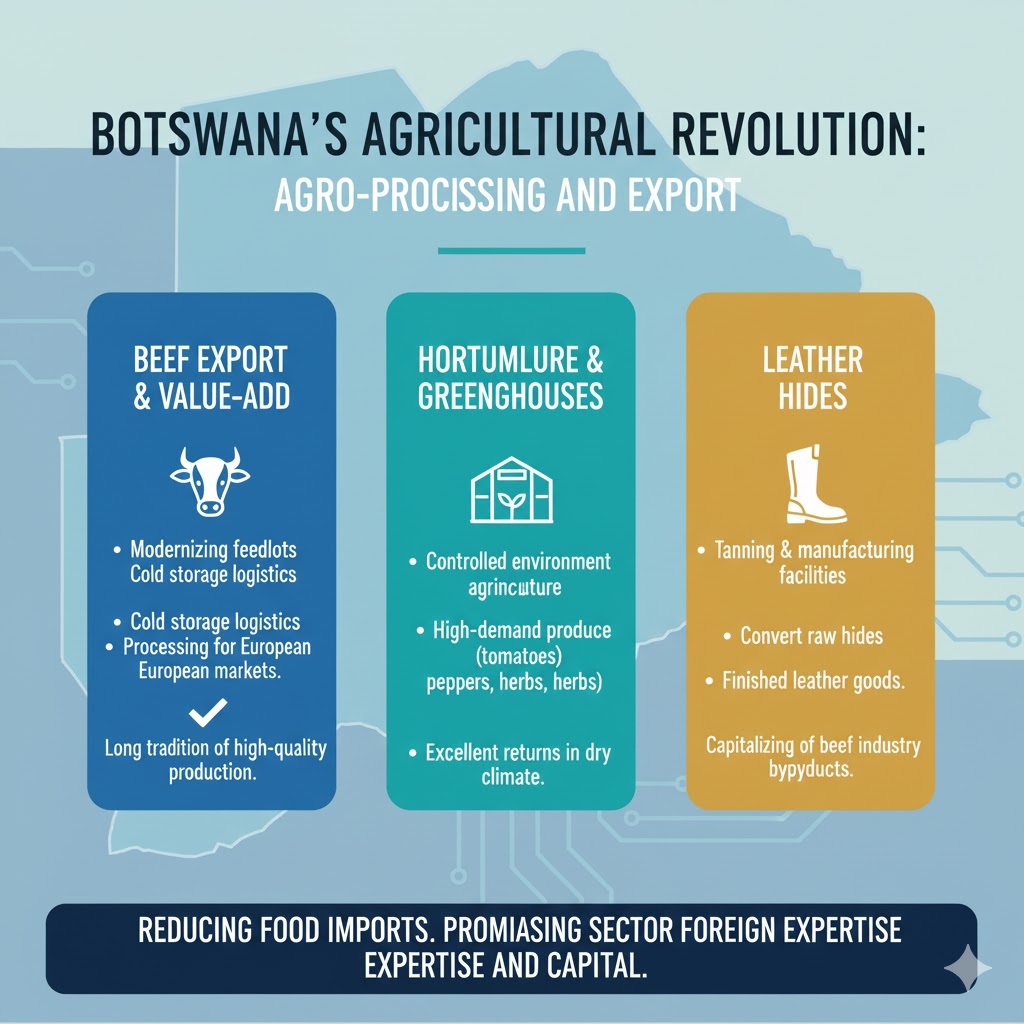
Beef Export and Value-Add: The country has a long tradition of high-quality beef production. Opportunities exist in modernizing feedlots, cold storage logistics, and processing beef for lucrative European markets.
Horticulture and Greenhouses: Due to the dry climate, controlled environment agriculture (greenhouses) for high-demand produce (tomatoes, peppers, herbs) offers excellent returns, capitalizing on incentives for import substitution.
Leather and Hides: Establishing tanning and manufacturing facilities to convert raw hides from the beef industry into finished leather goods.
Botswana Future Frontier: Technology and Financial Services (FinTech)
The government is keen to establish Botswana as a Botswana tech hub for Southern Africa. The young, educated population is ready to embrace digital solutions, presenting a blue ocean for innovation.
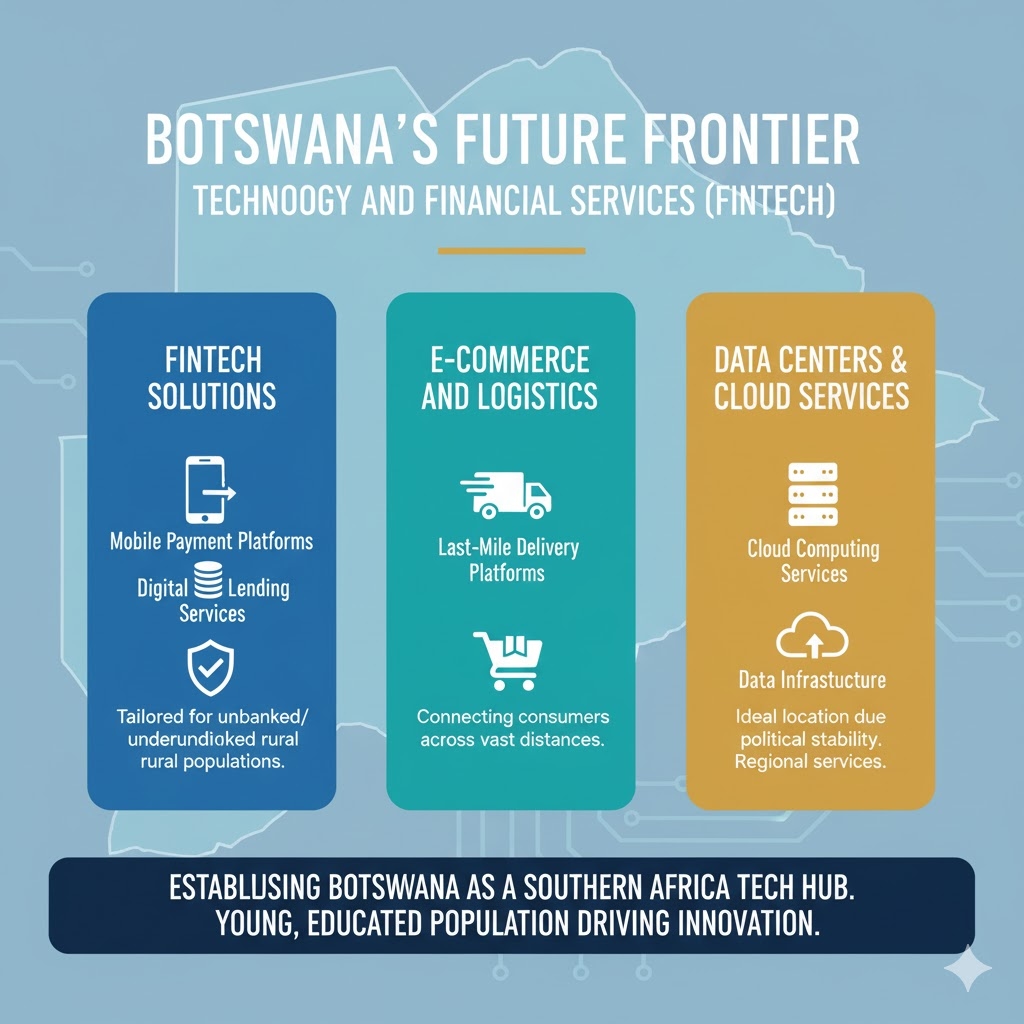
FinTech Solutions: Developing mobile payment platforms, digital lending services, and InsurTech solutions tailored for the largely unbanked or underbanked rural populations.
E-Commerce and Logistics: Building reliable last-mile delivery and e-commerce platforms to connect consumers across vast distances.
Data Centers and Cloud Services: Due to Botswana's political stability, it is an ideal location to host regional data infrastructure and provide cloud computing services to neighboring countries.
Legal Roadmap: How to Register a Business in Botswana
The process to start a business in Botswana for foreigners is managed through the Companies and Intellectual Property Authority (CIPA).

Name Reservation: Reserve your company name with CIPA.
Company Registration: Submit the prescribed forms, Memorandum and Articles of Association (or simply the company constitution for new registrations), and proof of director identity.
Taxes and Licensing: Register for income tax and VAT with the Botswana Unified Revenue Service (BURS). Obtain necessary sector-specific licenses (e.g., tourism license, manufacturing license) from relevant ministries.
The process has been increasingly digitized to promote efficiency.
Navigating Botswana Residency and Work Permits for Foreigners
While Botswana welcomes investment, managing the employment of foreigners is regulated to prioritize local skills development.
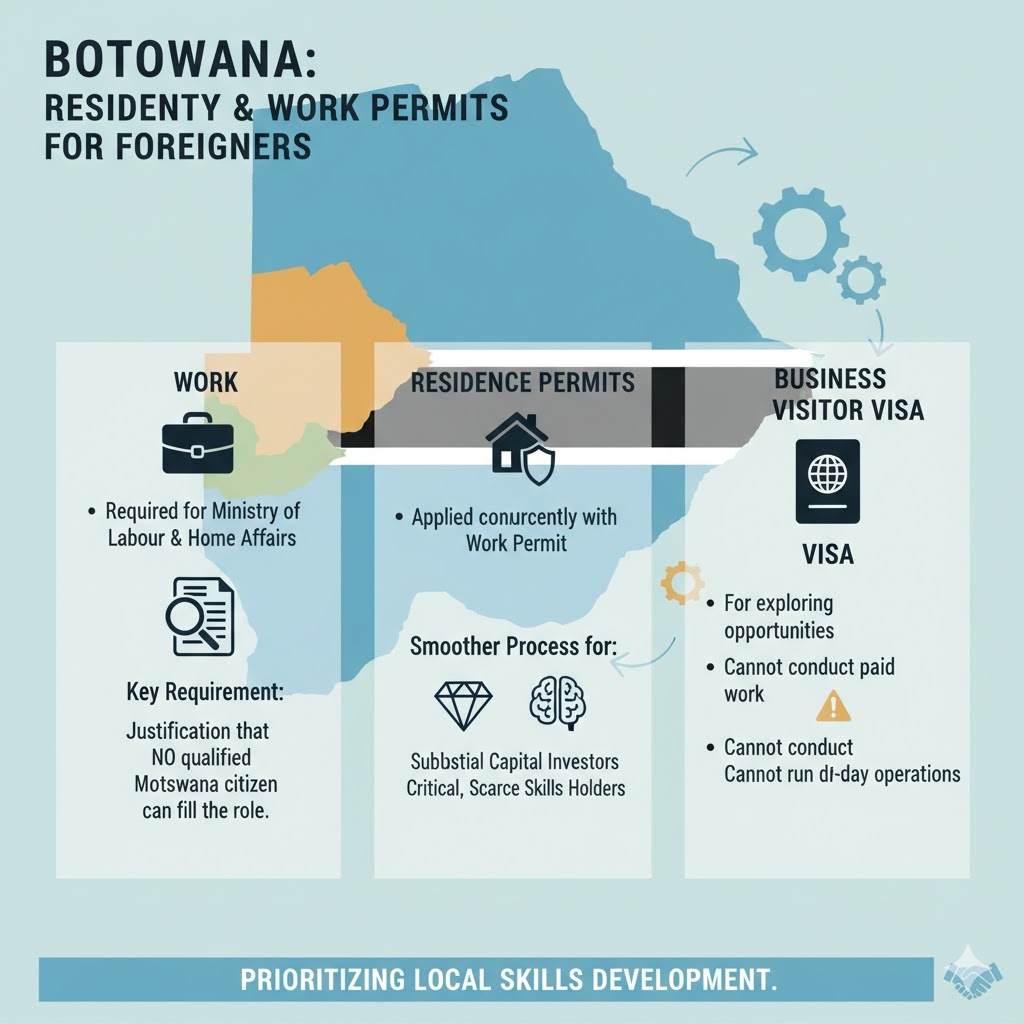
Work Permits: Foreigners who intend to work in their new company must apply for a Botswana work permit through the Ministry of Labour and Home Affairs. The application often requires a robust justification, showing that the position cannot be filled by a suitably qualified Motswana citizen.
Botswana Residence Permits: This is applied for concurrently with the work permit. Investors who commit substantial capital or bring critical, scarce skills have a smoother process.
Business Visitor Visa: Foreigners can enter on a standard visa (or visa-exempt status) to explore opportunities, but cannot conduct paid work or run day-to-day operations without a valid work and residence permit.
Accessing Local Finance and Investment Support in Botswana
Botswana offers dedicated institutions to help foreign projects scale up, especially those that align with national diversification goals:
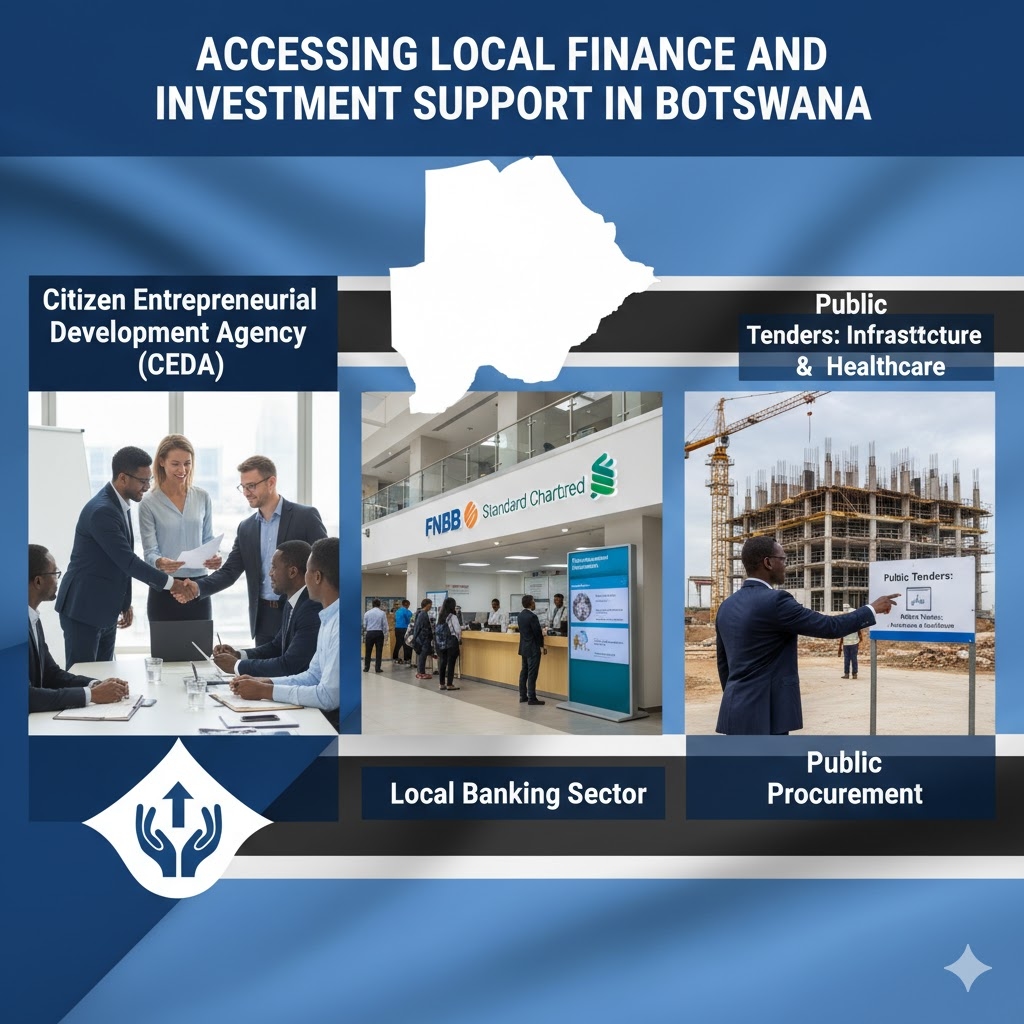
Citizen Entrepreneurial Development Agency (CEDA): While primarily focused on citizens, CEDA offers financing for projects where Batswana hold a majority stake or where the foreigner forms a strategic partnership with a local entrepreneur.
Local Banking Sector: Botswana has a highly developed and stable banking sector (e.g., FNBB, Standard Chartered) that is accustomed to handling international transactions and project financing.
Public Procurement: The government is a major buyer, and opportunities abound for foreign-led companies to participate in public tenders, particularly in infrastructure and healthcare services.
Botswana Consumer Market: Understanding Local Dynamics
The local market is small but possesses significant purchasing power, driven by the nation's consistent GDP growth. Success requires tailoring your product to local preferences while maintaining international quality.
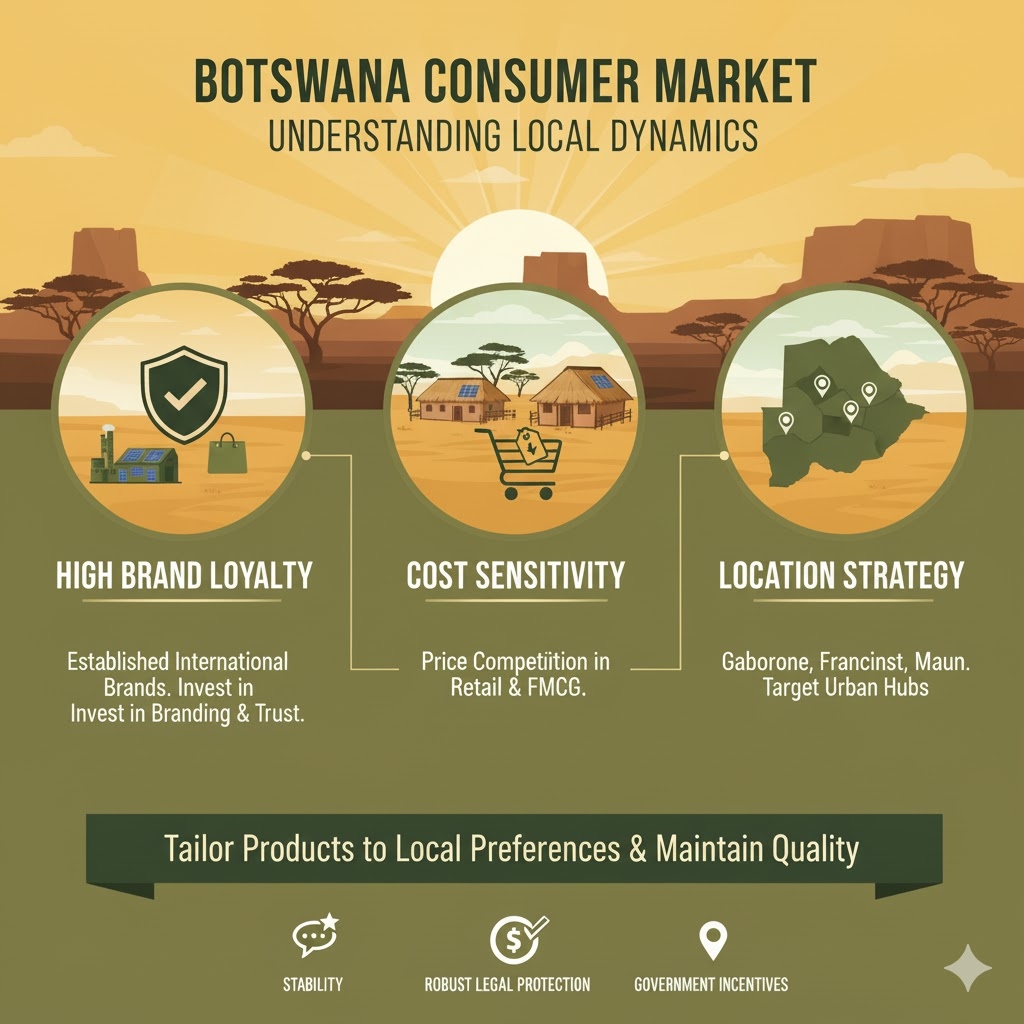
High Brand Loyalty: Consumers often favor established, high-quality international brands. New market entrants must invest heavily in branding and trust-building.
Cost Sensitivity: While purchasing power is high, price competition is stiff in sectors like retail and FMCG (Fast-Moving Consumer Goods).
Location Strategy: Gaborone, Francistown, and Maun are the primary commercial centers. A focused strategy targeting these urban hubs is essential before attempting nation-wide expansion.
Botswana Sustainable Infrastructure: Opportunities in Renewable Energy
Given the vast, sunny landscape and the government’s push for energy independence, Botswana business opportunities in the renewable sector are rapidly growing.
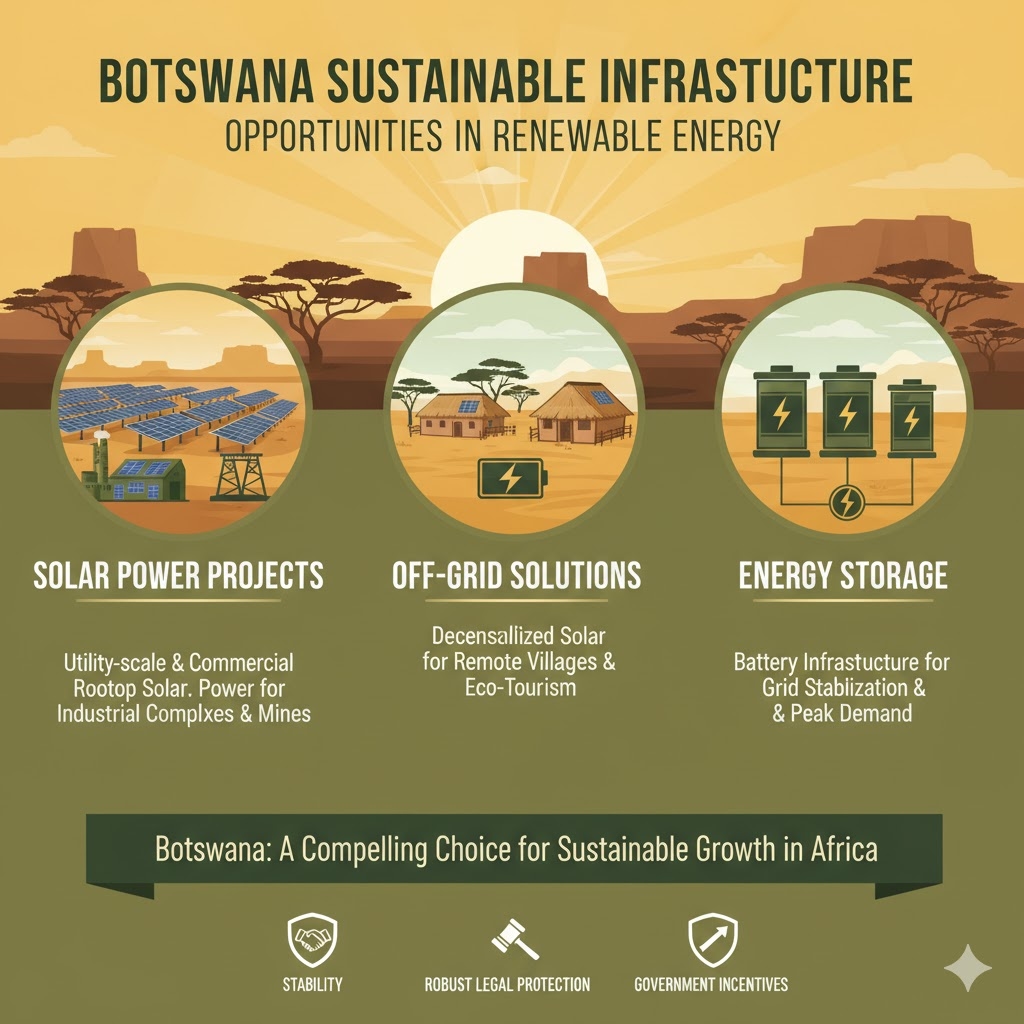
Solar Power Projects: Developing utility-scale or commercial rooftop solar installations to supply power to industrial complexes and mines.
Off-Grid Solutions: Providing small-scale, decentralized solar solutions for remote villages and eco-tourism lodges not connected to the main national grid.
Energy Storage: Investing in battery and energy storage infrastructure to stabilize the grid and manage peak demand.
Botswana’s strategic geographical position and its favorable political environment make it a compelling choice for any foreign investor seeking sustainable, long-term growth in Africa. The combination of stability, robust legal protection, and clear government incentives provides a foundation that is hard to beat.
